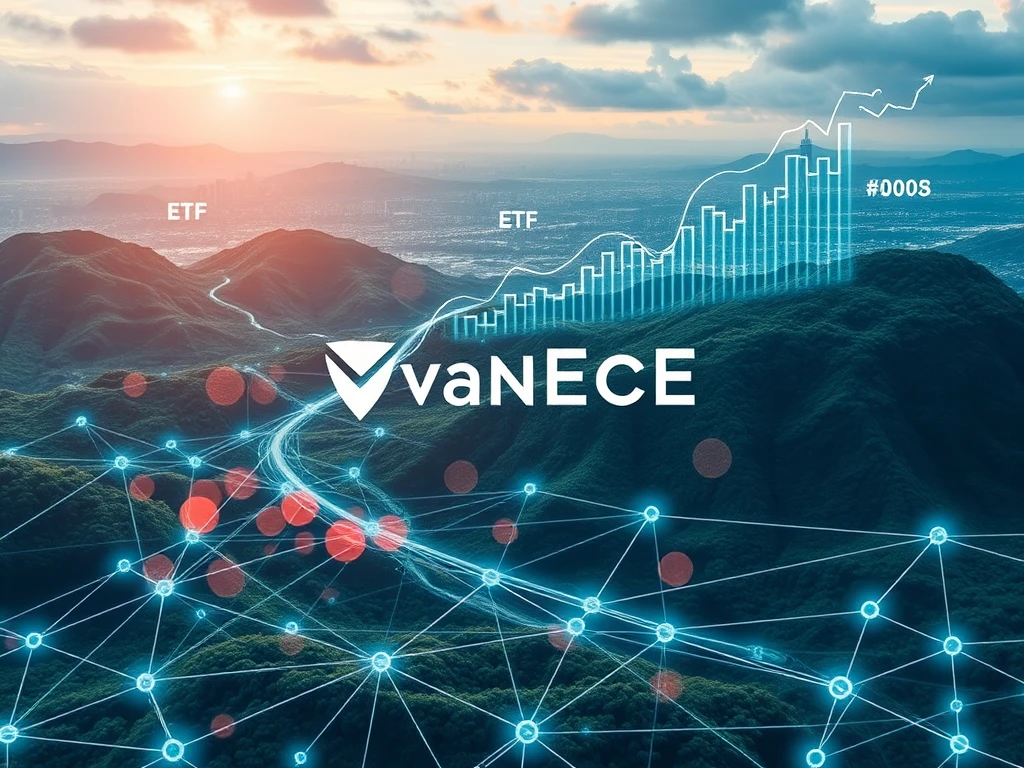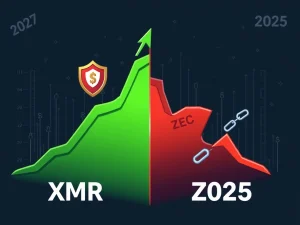Discover VanEck’s $NODE ETF: Unlocking the Future of Blockchain Investing

The world of investing is always evolving, and the rise of digital assets has opened up new possibilities. If you’re looking to participate in the growth of the blockchain space but prefer a more traditional investment vehicle, VanEck has launched an interesting option: the **VanEck Onchain Economy ETF** ($NODE). But what exactly is this **VanEck ETF**, and how does it aim to capture the potential of the digital economy?
What is the VanEck Onchain Economy ETF ($NODE)?
The **Onchain Economy ETF** ($NODE) is an actively managed fund designed to give investors exposure to companies that are key players in building out the digital asset ecosystem and leveraging blockchain technology. Instead of holding cryptocurrencies directly, this **VanEck ETF** focuses on the real-world companies driving blockchain adoption across various industries.
Scheduled to begin trading on May 14, 2025, after its inception the day before, $NODE positions itself as an active equity investment in businesses shaping the future digital economy. Being actively managed means a dedicated portfolio manager selects the stocks, using analysis rather than just following an index.
A unique aspect is the ETF’s ability to allocate up to 25% of its assets to crypto-linked exchange-traded products (ETPs). This is managed through a subsidiary in the Cayman Islands, allowing the fund to gain indirect exposure to digital assets while navigating US tax considerations. With a management fee of 0.69%, $NODE offers a diversified way to participate in the evolving digital asset economy.
How the NODE ETF Invests in Blockchain Companies
The **NODE ETF** aims to provide exposure to companies at the forefront of blockchain and digital asset innovation. The fund plans to hold between 30 and 60 stocks. These are selected from over 130 publicly traded companies considered integral to the digital asset ecosystem. The selection process is rigorous, combining fundamental analysis, market trend assessment, strategic positioning, and valuation metrics.
These **blockchain companies** operate across several key sectors:
- **Data centers:** Providing the infrastructure for blockchain networks.
- **Cryptocurrency exchanges:** Platforms like Coinbase that facilitate trading.
- **Miners:** Organizations involved in verifying Bitcoin transactions.
- **Crypto-holding companies:** Public companies with Bitcoin or other cryptocurrencies on their balance sheets.
- **Traditional financial institutions:** Banks and financial firms using blockchain solutions.
- **Consumer and gaming enterprises:** Companies integrating blockchain into consumer apps and games.
- **Asset managers:** Firms developing investment products for digital asset markets.
- **Energy infrastructure providers:** Businesses supporting crypto mining operations.
- **Semiconductor and hardware firms:** Companies like Nvidia making chips and equipment.
Beyond these stocks, the **NODE ETF** can allocate up to 25% of its assets to cryptocurrency ETPs for indirect digital asset exposure, managed via its Cayman Islands subsidiary.
Managing Risk with the NODE ETF: Leveraging Bitcoin Cycles
VanEck’s approach with the **NODE ETF** includes a strategy to manage market volatility. While the fund focuses on companies leveraging blockchain for real-world applications, it uses Bitcoin cycle indicators to dynamically adjust its risk exposure. These indicators are based on historical Bitcoin price patterns and help align the portfolio with broader market sentiment and crypto-economic cycles.
This means the **NODE ETF** doesn’t just buy and hold; it actively seeks to optimize performance by considering the cyclical nature of the crypto market, even though it doesn’t hold Bitcoin or other cryptocurrencies directly. Events like Bitcoin halving or long-term price trends can signal when to take more or less risk in the portfolio’s equity holdings.
Comparing the NODE ETF to Traditional Equity ETFs
The **NODE ETF** differs significantly from general equity ETFs like those tracking the S&P 500. Here’s a simple comparison:
| Feature | VanEck $NODE ETF | General Equity ETFs |
|---|---|---|
| Investment Focus | Companies adopting/building blockchain technology | Broad market indexes (e.g., S&P 500) |
| Management Style | Actively Managed | Typically Passive |
| Direct Crypto Hold | No | No |
| Risk Adjustment | Uses Bitcoin Cycle Metrics | Standard market analysis |
| Goal | Exposure to digital transformation | Broad market exposure |
This active, focused approach means the **NODE ETF** has a management fee, reflecting the hands-on strategy to navigate the fast-changing blockchain landscape.
How to Buy the NODE ETF
To buy shares of the **NODE ETF**, you will need a brokerage account that provides access to the Cboe BZX Exchange. This is where the ETF is listed and trades.
Once your account is set up and funded, search for the ticker symbol “NODE.” Before placing a buy order, take time to review the ETF’s details, including its investment strategy, holdings, and the management fee. $NODE trades during regular market hours, just like any standard stock or ETF.
As with any investment, it’s important to understand the fund’s objectives and risks beforehand to ensure it aligns with your personal financial goals and risk tolerance.
Understanding Risks and Institutional Interest in the Crypto ETF Landscape
VanEck’s launch of $NODE comes at a time of growing institutional interest in crypto-linked investments and an evolving regulatory environment. Recent approvals of spot Bitcoin ETFs in the US and proposals like a US Strategic Bitcoin Reserve signal increasing institutional engagement. Surveys show a rising number of financial advisors seeking crypto-equity options for clients.
However, the **Crypto ETF** landscape, and products like $NODE, still carry unique risks tied to the volatile crypto ecosystem. While $NODE doesn’t hold cryptocurrencies directly, its portfolio companies are exposed to market volatility, Bitcoin price swings, and potential tech stock corrections. Regulatory changes could also impact the broader blockchain industry.
Additionally, the fund’s strategy involving derivatives and a Cayman subsidiary introduces potential counterparty and liquidity risks. Investors should carefully weigh these sector-specific vulnerabilities against the fund’s compliance-driven structure and VanEck’s reputation in asset management.
Summary
The VanEck Onchain Economy ETF ($NODE) offers investors a targeted way to gain exposure to the growth of the blockchain economy by investing in the companies building its infrastructure and applications. Through an actively managed approach, a diversified portfolio of blockchain-focused companies, and indirect exposure via crypto ETPs, $NODE provides an alternative to direct cryptocurrency investment. While it leverages insights from Bitcoin market cycles for risk management and aligns with increasing institutional interest, investors should be aware of the inherent volatility and specific risks associated with the digital asset sector. As the digital transformation continues, $NODE represents a forward-looking investment vehicle for those interested in the future of finance and technology.









